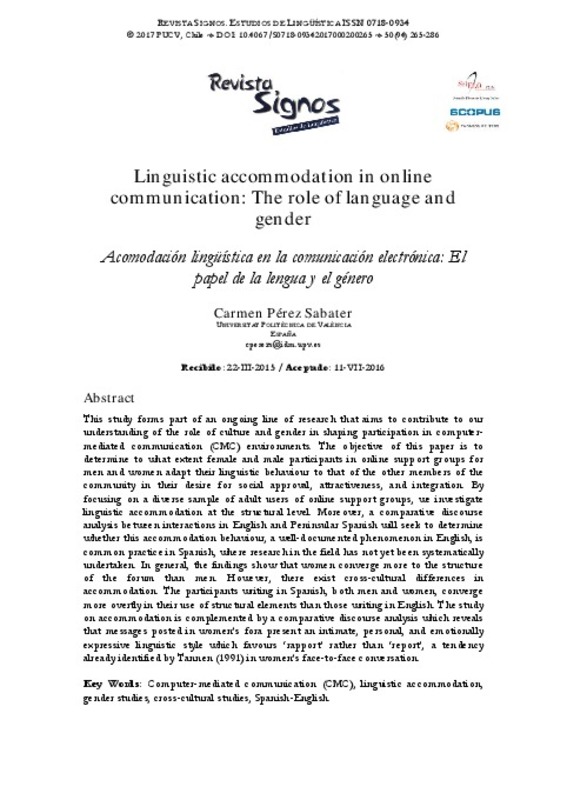JavaScript is disabled for your browser. Some features of this site may not work without it.
Buscar en RiuNet
Listar
Mi cuenta
Estadísticas
Ayuda RiuNet
Admin. UPV
Linguistic accommodation in online communication: The role of language and gender
Mostrar el registro sencillo del ítem
Ficheros en el ítem
| dc.contributor.author | Pérez-Sabater, Carmen
|
es_ES |
| dc.date.accessioned | 2018-12-15T21:00:38Z | |
| dc.date.available | 2018-12-15T21:00:38Z | |
| dc.date.issued | 2017 | es_ES |
| dc.identifier.uri | http://hdl.handle.net/10251/113823 | |
| dc.description.abstract | [ES] Este estudio forma parte de una investigación en curso centrada en analizar el papel de la cultura y el género en cómo se moldea la participación en la comunicación electrónica. El objetivo de este artículo es determinar en qué medida participantes femeninos y masculinos en grupos de ayuda en línea para hombres y mujeres adaptan su comportamiento lingüístico a los demás miembros de la comunidad buscando aprobación social, gustar a los demás e integración. En un corpus formado por interacciones de adultos en grupos de ayuda se observa acomodación lingüística a nivel estructural. Además, un análisis del discurso comparando interacciones en español peninsular e inglés tratará de determinar si esta acomodación, un fenómeno bien documentado en inglés, es una práctica común en español peninsular, donde no se han realizado investigaciones sistemáticas en este campo. Los resultados muestran que, en general, las mujeres convergen más que los hombres en la estructura del foro de discusión. Sin embargo, existen diferencias interculturales en cuanto a la acomodación. Los participantes en español, tanto hombres como mujeres, convergen más destacadamente en los elementos estructurales que en inglés. El estudio sobre acomodación lingüística se complementa con un análisis del discurso que resalta el estilo íntimo, personal y emocionalmente expresivo de los mensajes escritos por mujeres y que favorece las buenas relaciones en lugar del mero intercambio de información, tendencia ya identificada por Tannen (1991) en las conversaciones cara a cara entre mujeres. | es_ES |
| dc.description.abstract | [EN] This study forms part of an ongoing line of research that aims to contribute to our understanding of the role of culture and gender in shaping participation in computer-mediated communication (CMC) environments. The objective of this paper is to determine to what extent female and male participants in online support groups for men and women adapt their linguistic behaviour to that of the other members of the community in their desire for social approval, attractiveness, and integration. By focusing on a diverse sample of adult users of online support groups, we investigate linguistic accommodation at the structural level. Moreover, a comparative discourse analysis between interactions in English and Peninsular Spanish will seek to determine whether this accommodation behaviour, a well-documented phenomenon in English, is common practice in Spanish, where research in the field has not yet been systematically undertaken. In general, the findings show that women converge more to the structure of the forum than men. However, there exist cross-cultural differences in accommodation. The participants writing in Spanish, both men and women, converge more overtly in their use of structural elements than those writing in English. The study on accommodation is complemented by a comparative discourse analysis which reveals that messages posted in women's fora present an intimate, personal, and emotionally expressive linguistic style which favours 'rapport' rather than 'report', a tendency already identified by Tannen (1991) in women's face-to-face conversation. | es_ES |
| dc.language | Inglés | es_ES |
| dc.publisher | SciELO Comision Nacional de Investigacion Cientifica Y Tecnologica | es_ES |
| dc.relation.ispartof | Revista Signos. Estudios de Lingüística (Online) | es_ES |
| dc.rights | Reserva de todos los derechos | es_ES |
| dc.subject | Computer-mediated communication (CMC) | es_ES |
| dc.subject | Linguistic accommodation | es_ES |
| dc.subject | Gender studies | es_ES |
| dc.subject | Cross-cultural studies | es_ES |
| dc.subject | Spanish-English. | es_ES |
| dc.subject.classification | FILOLOGIA INGLESA | es_ES |
| dc.title | Linguistic accommodation in online communication: The role of language and gender | es_ES |
| dc.type | Artículo | es_ES |
| dc.identifier.doi | 10.4067/S0718-09342017000200265 | es_ES |
| dc.rights.accessRights | Abierto | es_ES |
| dc.contributor.affiliation | Universitat Politècnica de València. Departamento de Lingüística Aplicada - Departament de Lingüística Aplicada | es_ES |
| dc.description.bibliographicCitation | Pérez-Sabater, C. (2017). Linguistic accommodation in online communication: The role of language and gender. Revista Signos. Estudios de Lingüística (Online). 50(94):265-286. doi:10.4067/S0718-09342017000200265 | es_ES |
| dc.description.accrualMethod | S | es_ES |
| dc.relation.publisherversion | http://doi.org/10.4067/S0718-09342017000200265 | es_ES |
| dc.description.upvformatpinicio | 265 | es_ES |
| dc.description.upvformatpfin | 286 | es_ES |
| dc.type.version | info:eu-repo/semantics/publishedVersion | es_ES |
| dc.description.volume | 50 | es_ES |
| dc.description.issue | 94 | es_ES |
| dc.identifier.eissn | 0718-0934 | es_ES |
| dc.relation.pasarela | S\352664 | es_ES |








